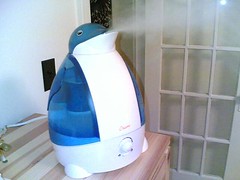
- Image by joshbousel via Flickr
It’s amazing how many people complain about the condition of their skin during the colder months of the year. My daughter, for instance, has horrible dry, peeling skin on her face, (specifically her eyelids) and neck. The reason is there is less moisture in the air, both indoors and outdoors, during the winter. You don’t have to wonder about how to treat problem skin during the winter anymore; follow these steps and your skin will look great.
To combat the lack of moisture in your home, be sure to set up a humidifier and keep it running while you’re at home. This will replace the moisture in the air which will help your skin look better.
Rather than taking long, hot showers during the winter, take shorter, lukewarm showers. Ten minutes is about the limit. Why lukewarm showers? Hot water wicks the moisture and natural oils from your skin.
Find an alcohol-free moisturizer and use it every time you bathe or take a shower. This will enable the most moisture to be absorbed back into the skin. You can also reapply a moisturizer whenever you feel your skin becoming dry. We love Eucerin lotion as well as Mercola’s Organic Body Butter this time of the year.
Caffeinated beverages like coffee, alcohol, or soft drinks actually have a dehydrating effect. So, you may want to avoid them during the winter. Instead, to combat the possibility of being dehydrated, drink eight to ten glasses of water.
Don’t forget to take care of yourself during the winter. Eat a healthy diet and take a multivitamin to ensure you’re not missing any important nutrients. Being healthy on the inside may show through the condition of your skin on the outside.
Be sure to put on gloves, a hat, scarf, and coat every time you go outdoors. You may not be outside for long, but that short time can be enough to suck the moisture right out of your skin. You may also be affected by wind. Using rubber gloves during cleaning will also help protect your skin.
Avoid wool or synthetic materials during colder months as they make winter skin itchier than softer fabrics. If you need wool for warmth, be sure to wear a layer of cotton between the wool and your skin.
Dry, itchy skin isn’t fun at any time of the year, but it’s even worse during the winter. Knowing how to treat problem skin during winter is important, and following some of these tips may allow you to enjoy the season this year.
![Reblog this post [with Zemanta]](http://img.zemanta.com/reblog_c.png?x-id=56a1c575-9ba1-417e-bf29-e4d752f28309)